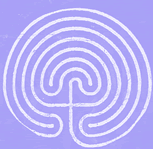Have recently been exploring John Cage’s
connection to James Joyce.
--Can’t afford this: “John Cage Performs
James Joyce”, a VHS going for $150 on
Amazon.com but imagine it would be quite
something to see.
- Missed this in 2002 at Berkeley:
Cage’s “Marcel Duchamp, James Joyce,
Eric Satie: An Alphabet”
- Found the following on the Modern Word
website, an excellent Joyce site:
John Cage (1912-1992)
John Cage was an American composer who
forever changed the face of modern music.
A musical revolutionary, Cage believed,
among other things, that chance played
just as an important role in our life as design,
and that music was to be found everywhere
-- it was all in the ear of the beholder. His
music was iconoclastic, often difficult, always
surprising, and probed the limits of human
imagination and preconceptions.
"The Wonderful Widow of Eighteen Springs" --
(1942) A song adapted from the "Isobel"
passage from Finnegans Wake.
Roaratorio -- (1979) This large and chaotic
work incorporates phrases from Finnegans
Wake into a tapestry of noise, voice, song,
and Irish traditional music.
Writing for the Second Time Through Finnegans
Wake -- (1979) The "libretto" of the above
work, Roaratorio. Spoken by John Cage.
Marcel Duchamp, James Joyce, Eric Satie:
An Alphabet -- (1982) A radio play featuring
James Joyce as a character.
"Nowth Upon Nacht" -- (1984) A song with
lyics directly adapted from Finnegans Wake.
Monday, January 26, 2004
Blog Archive
-
►
2009
(3)
- ► 06/14 - 06/21 (1)
- ► 06/07 - 06/14 (2)
-
►
2008
(12)
- ► 09/28 - 10/05 (1)
- ► 07/06 - 07/13 (2)
- ► 06/29 - 07/06 (2)
- ► 06/15 - 06/22 (1)
- ► 06/08 - 06/15 (2)
- ► 06/01 - 06/08 (1)
- ► 05/25 - 06/01 (1)
- ► 05/04 - 05/11 (1)
- ► 04/27 - 05/04 (1)
-
►
2007
(1)
- ► 04/08 - 04/15 (1)
-
►
2006
(12)
- ► 10/22 - 10/29 (1)
- ► 09/10 - 09/17 (1)
- ► 08/06 - 08/13 (2)
- ► 07/16 - 07/23 (1)
- ► 06/04 - 06/11 (2)
- ► 05/07 - 05/14 (1)
- ► 03/05 - 03/12 (2)
- ► 01/29 - 02/05 (2)
-
►
2005
(13)
- ► 10/30 - 11/06 (1)
- ► 09/25 - 10/02 (1)
- ► 07/17 - 07/24 (1)
- ► 07/03 - 07/10 (1)
- ► 06/12 - 06/19 (1)
- ► 06/05 - 06/12 (1)
- ► 05/29 - 06/05 (2)
- ► 05/22 - 05/29 (2)
- ► 05/08 - 05/15 (1)
- ► 04/24 - 05/01 (1)
- ► 04/03 - 04/10 (1)
-
▼
2004
(57)
- ► 12/12 - 12/19 (3)
- ► 09/26 - 10/03 (1)
- ► 09/05 - 09/12 (1)
- ► 08/29 - 09/05 (1)
- ► 08/22 - 08/29 (1)
- ► 08/08 - 08/15 (1)
- ► 08/01 - 08/08 (2)
- ► 07/25 - 08/01 (1)
- ► 07/18 - 07/25 (1)
- ► 07/11 - 07/18 (1)
- ► 07/04 - 07/11 (2)
- ► 06/27 - 07/04 (1)
- ► 06/20 - 06/27 (2)
- ► 06/13 - 06/20 (4)
- ► 06/06 - 06/13 (1)
- ► 05/30 - 06/06 (1)
- ► 05/23 - 05/30 (1)
- ► 05/16 - 05/23 (2)
- ► 05/09 - 05/16 (2)
- ► 05/02 - 05/09 (2)
- ► 04/25 - 05/02 (1)
- ► 04/18 - 04/25 (3)
- ► 04/11 - 04/18 (1)
- ► 04/04 - 04/11 (2)
- ► 03/28 - 04/04 (2)
- ► 03/14 - 03/21 (1)
- ► 03/07 - 03/14 (3)
- ► 02/29 - 03/07 (1)
- ► 02/22 - 02/29 (2)
- ► 02/15 - 02/22 (2)
- ► 02/08 - 02/15 (2)
- ► 02/01 - 02/08 (2)
- ► 01/11 - 01/18 (1)
- ► 01/04 - 01/11 (2)
-
►
2003
(101)
- ► 12/28 - 01/04 (2)
- ► 12/21 - 12/28 (1)
- ► 12/14 - 12/21 (1)
- ► 12/07 - 12/14 (1)
- ► 11/30 - 12/07 (2)
- ► 11/23 - 11/30 (5)
- ► 11/16 - 11/23 (2)
- ► 11/09 - 11/16 (4)
- ► 11/02 - 11/09 (5)
- ► 10/26 - 11/02 (4)
- ► 10/19 - 10/26 (4)
- ► 10/12 - 10/19 (4)
- ► 10/05 - 10/12 (6)
- ► 09/28 - 10/05 (7)
- ► 09/21 - 09/28 (7)
- ► 09/14 - 09/21 (7)
- ► 09/07 - 09/14 (9)
- ► 08/31 - 09/07 (7)
- ► 08/24 - 08/31 (7)
- ► 08/17 - 08/24 (8)
- ► 08/10 - 08/17 (4)
- ► 08/03 - 08/10 (4)





